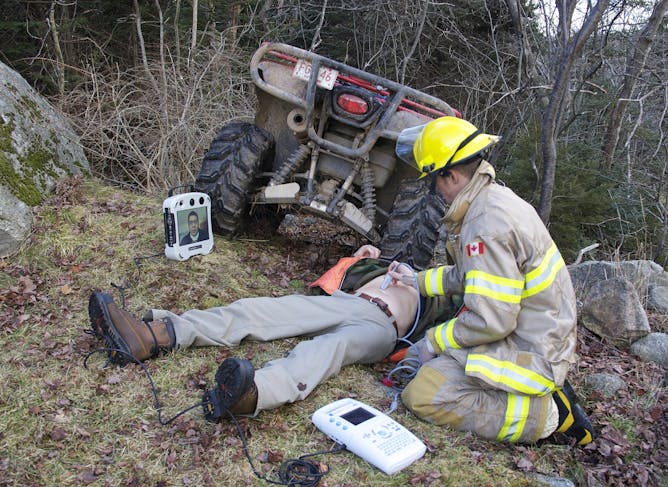|
It’s easy to take technology for granted, especially when we all carry around a phone with more computing power than NASA had when it was sending astronauts to the moon. But today in The Conversation Canada, we have a story of how technology can truly help change the lives of Canadians who live in northern communities. Ivar Mendez, head of the department of surgery at the University of Saskatchewan, tells us how remote robotics are connecting doctors with patients hundreds of kilometres apart.
Other good Wednesday reads:
-
Canada has been lauded for the academic achievement of its immigrant students, but researchers have no data to determine what impact race and racism has on educational success.
-
The United Nations Declaration on sustainable development stresses “leaving no one behind.” But what about the factors that cause many to be behind in the first place?
-
Last month’s wildfires in California are another example of how bad things happen when communities expand into areas surrounded by forests. But smart planning and some simple things – like cleaning out your eavestrough – can help minimize the impact.
And finally...if you’re wearing out your credit card this holiday season, a small consolation may be that you’re racking up the loyalty points. We’ve got two business school profs – Michael Armstrong of Brock University and Aaron Luntala Nsakanda of Carleton University – who explain how and why businesses bother with loyalty programs.
Regards,
|

Remote presence technology enables a medic to perform an ultrasound at the scene of accident.
(University of Saskatchewan)
Ivar Mendez, University of Saskatchewan
A remote medicine program in Saskatchewan allows acutely ill children and pregnant women to be treated by specialist doctors, without leaving their communities.
|

Canadians seem not to want to talk about race and racism, deferring instead to ‘income’ and immigration status when it comes to measuring education success.
LeonardoBurgos /Unsplash
Karen Robson, McMaster University
News of Canada's successful immigrant students glosses over important stories of racism, for example the 'streaming' of Black males. But without more data beyond Toronto, the story is hard to share.
|

The United Nations says people “left behind” include those vulnerable to the effects of climate change, but aren’t the furthest behind those damaging the environment? Here, a man rides a bicycle through a devastated Homs, Syria. Numerous studies say climate change was a factor in record-setting drought, one of several causes of the country’s civil war.
AP Photo/Dusan Vranic
Maisam Najafizada, Memorial University of Newfoundland; Sunisha Neupane, Université de Montréal
The United Nations Declaration on sustainable development stresses "leaving no-one behind," but what about the factors that cause many to be behind in the first place?
|

Firefighters battle the Camp Fire as it tears through Paradise, Calif. on Nov. 8, 2018.
AP Photo/Noah Berger, File)
Eric B. Kennedy, York University, Canada
Where we build our communities and how we build them has an outsize role in our vulnerability to wildfire.
|

Many of us collect points via loyalty programs. They’re popular, but can cause headaches for the companies who head up loyalty and rewards programs.
(Shutterstock)
Michael J. Armstrong, Brock University; Aaron Luntala Nsakanda, Carleton University
The companies that head up loyalty rewards programs must compensate for their uncertainty about your reward preferences.
|

Sur vos mains, vos télécommandes ou vos poignées de porte, le virus de la grippe est partout. Un scientifique nous dit comment l'éliminer de votre foyer.
shutterstock
Jason Tetro, University of Guelph
Sur vos mains, vos télécommandes ou vos poignées de porte, le virus de la grippe est partout. Un scientifique nous dit comment l'éliminer de votre foyer.
|
Environment + Energy
|
-
John Freemuth, Boise State University
The Interior Department is expanding oil and gas leasing on land in six western states that is vital habitat for the greater sage grouse. Lawsuits are certain to follow.
|
|
Health + Medicine
|
-
Helle Gerbild, University of Southern Denmark; Christian Graugaard, Aalborg University; Kristina Areskoug-Josefsson, Jönköping University
Aerobic exercise can improve erections in men suffering from erectile dysfunction.
|
|
Arts
|
-
Adam Turner, University of Newcastle
With his beard, trident, and status as Atlantean ruler, the superhero Aquaman borrows many traits from the sea gods of mythology.
|
|